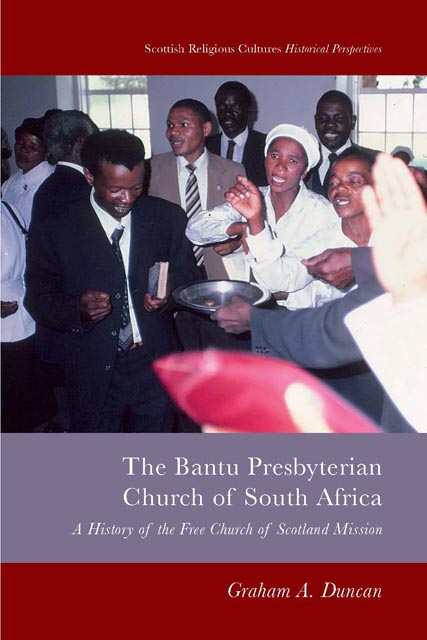Book contents
- Frontmatter
- Contents
- Acknowledgements
- Timeline
- A Presbyterian Anthem
- Introduction
- 1 Background to this Study
- 2 The Origins and Early Development of Scottish Presbyterian Mission in South Africa, 1824–65
- 3 Rev. Tiyo Soga (1829–71): A Paragon of Early Indigenous Leadership
- 4 The Role of Mission Councils in the Scottish Mission in South Africa, 1864–1923
- 5 The Rev. Edward Tsewu’s Dispute with the Free Church of Scotland Mission
- 6 The Mzimba Secession, 1898: A South African ‘Disruption’
- 7 Presbyterianism in South Africa, 1897–1923: To Unite orNot to Unite?
- 8 Preparations for the Formation of the Bantu Presbyterian Church of South Africa, 1897–1919
- 9 The Formation of the Bantu Presbyterian Church of South Africa, 1920–3
- 10 Mission to Church – Church to Mission: The First Ten Years, 1923–33
- 11 Reaching Out: The Bantu Presbyterian Church in South Africa and the Presbyterian Church of South Africa and Ecumenism, 1923–39
- 12 The Bantu Presbyterian Church in South Africa and Ecumenism, 1940–99
- 13 The End of Mission Councils: The Church of Scotland South Africa Joint Council, 1971–81
- 14 A Young Church in Mission or Maintenance Mode?: The Bantu Presbyterian Church of South Africa, 1923–99
- 15 The Bantu/Reformed Presbyterian Church and Socio-political Issues
- 16 Bantu/Reformed Presbyterian ChurchWomen in Leadership in Ministry
- Conclusion: Indigenous Presbyterians and Missionaries –Transferring Contending Roles and Responsibilities
- Bibliography
- Index
14 - A Young Church in Mission or Maintenance Mode?: The Bantu Presbyterian Church of South Africa, 1923–99
Published online by Cambridge University Press: 26 November 2022
- Frontmatter
- Contents
- Acknowledgements
- Timeline
- A Presbyterian Anthem
- Introduction
- 1 Background to this Study
- 2 The Origins and Early Development of Scottish Presbyterian Mission in South Africa, 1824–65
- 3 Rev. Tiyo Soga (1829–71): A Paragon of Early Indigenous Leadership
- 4 The Role of Mission Councils in the Scottish Mission in South Africa, 1864–1923
- 5 The Rev. Edward Tsewu’s Dispute with the Free Church of Scotland Mission
- 6 The Mzimba Secession, 1898: A South African ‘Disruption’
- 7 Presbyterianism in South Africa, 1897–1923: To Unite orNot to Unite?
- 8 Preparations for the Formation of the Bantu Presbyterian Church of South Africa, 1897–1919
- 9 The Formation of the Bantu Presbyterian Church of South Africa, 1920–3
- 10 Mission to Church – Church to Mission: The First Ten Years, 1923–33
- 11 Reaching Out: The Bantu Presbyterian Church in South Africa and the Presbyterian Church of South Africa and Ecumenism, 1923–39
- 12 The Bantu Presbyterian Church in South Africa and Ecumenism, 1940–99
- 13 The End of Mission Councils: The Church of Scotland South Africa Joint Council, 1971–81
- 14 A Young Church in Mission or Maintenance Mode?: The Bantu Presbyterian Church of South Africa, 1923–99
- 15 The Bantu/Reformed Presbyterian Church and Socio-political Issues
- 16 Bantu/Reformed Presbyterian ChurchWomen in Leadership in Ministry
- Conclusion: Indigenous Presbyterians and Missionaries –Transferring Contending Roles and Responsibilities
- Bibliography
- Index
Summary
Introduction
The ecumenical movement does not derive simply from a passion for unity; it sprang from a passion for unity that is completely fused in the mission. (Le Guillou cited in Boegner 1970: 269)
he fact that it was largely the missionary endeavours of churches and missionary societies during the eighteenth and nineteenth centuries which gave birth to the ecumenical movement of the twentieth century, is generally accepted today. (Saayman 1984: 8)
This is true of any Reformed church community, the subjects of mission and unity are integrally interrelated as seen from the Scottish mission to South Africa. Scottish Presbyterians were always prepared to work with others in pursuit of their mission all in the same of seeking the unity of Christ's church. The overlapping agenda of the Church in Scotland was easily transportable to South Africa. However, Africans were also confused by the different versions of Christianity they were presented with. In their traditional contexts they were not exposed to different versions of African traditional religion. In some ways these imported traditions actually militated against the ecumenical impulse.
Up until this point we have been looking mainly at external developments in the outreach of the RPCSA in relation to other South African denominations. However, there was also a considerable amount of effort being expended both in its internal missionary and evangelical outputs and in developing its own distinctive tradition.
The story of the first hundred years of the Scottish mission in South Africa has been discussed. This led to the formation of the Bantu Presbyterian Church of South Africa in 1923 (Duncan 2016b). In her study of the history of the Scottish mission in South Africa, Sheila Brock (1974: 60) contended that ‘ecclesiastical separate development in the political circumstances of South Africa since 1820 have not given much scope to the Bantu Presbyterian Church and it has not proved itself a particularly inspiring example to follow’. This chapter challenges Brock's assertion by examining the extent to which the BPCSA remained true to its Constitution ‘in the form of a self-governing Native Church’ (BPCSA 1958: 113) and ‘an autonomous branch of the Holy, Catholic Church’ (BPCSA 1958: 114) ‘labouring for the advancement of the Kingdom of God throughout the world’ (BPCSA 1958: 115) from its formation in 1923 until union with the Presbyterian Church of Southern Africa (PCSA) in 1999.
- Type
- Chapter
- Information
- Bantu Presbyterian Church of South AfricaA History of the Free Church of Scotland Mission, pp. 174 - 185Publisher: Edinburgh University PressPrint publication year: 2022



